After receding from the national stage, the free college movement is resurfacing as a central rallying point for Democrats as they set their sights on the White House.
At least 18 of the party's 23 presidential contenders have come out in support of some version of free college . Sen. Elizabeth Warren of Massachusetts promises free tuition at public colleges and universities. Sen. Amy Klobuchar of Minnesota says it should be limited to two years of community college. Sen. Kirsten Gillibrand of New York wants to provide free tuition in exchange for public service.
The candidates are responding to what some say is a crisis in college affordability, an issue likely to draw attention in the first primary debates later this month. Year after year, colleges say they have to raise tuition to offset state funding cuts. Students have shouldered the cost by taking out loans, pushing the country's student debt to nearly $1.6 trillion this year. Even for many in the middle class, experts say, college is increasingly moving out of reach.
Free college, a catchall term for a range of affordability plans, is increasingly seen as a solution. Nearly 20 states now promise some version of free college, from Tennessee's free community college program to New York's Excelsior Scholarship, which offers up to four years of free tuition at state schools for residents with family incomes below $125,000 a year.
But research on the effectiveness of state programs has been mixed. Critics say the offers are often undermined by limited funding and come with narrow eligibility rules that exclude many students.
"This is a problem that has not gone away but has gotten worse in many communities," said Mark Huelsman, associate director of policy and research for Demos, a liberal think tank. "It's enough of a problem that people expect some action on it, and they expect some plan for how to get there."
Plans from Warren, Vermont Sen. Bernie Sanders and former Obama housing chief Julian Castro aim to eliminate tuition at all public institutions. The candidates say that would open college to a wider group of Americans and greatly reduce the need for loans. Warren argues that college, like other levels of schooling, is "a basic public good that should be available to everyone with free tuition and zero debt at graduation."
Others, including Klobuchar and former Vice President Joe Biden, have backed more moderate plans to provide two years of free tuition at community colleges, similar to an idea pushed by President Barack Obama in 2015.
And there are some who say students should be able to graduate without debt. To do that, several candidates want to help students with tuition as well as textbooks and living costs. Such "debt-free" plans, which aim to steer money toward students with lower incomes, are supported Sen. Kamala Harris of California and Pete Buttigieg, the mayor of South Bend, Indiana, among others.
Proposals for free college nationwide started to gain popularity among Democrats during the Obama administration and in the 2016 primary race. That discussion stalled after the election of President Donald Trump, who is seen as hostile to the idea. His administration blames colleges for the debt crisis, saying they ramp up tuition because they know students have easy access to federal loans.
Before Trump was elected, Sanders was credited with bringing the issue to the fore when he campaigned on a promise to make tuition free at public colleges. Hillary Clinton, the party's 2016 nominee, initially criticized the idea but later adopted a similar plan. Now, early in the 2020 race, Democrats have been quick to show their support. Instead of debating whether it should be free, most are weighing which model is best and how to achieve it.
"It's striking how much the debate has shifted over the past decade," Huelsman said. "If you look at the 2008 election, 2012, it was not something that was necessarily a prominent part of the debate."
For most candidates, free college is just part of the solution as they confront student debt and college access. Several also promise to help borrowers refinance loans at lower interest rates; some want to wipe away huge chunks of the nation's student debt.
Those types of proposals are likely to be popular among the growing share of voters paying off student loans, said Douglas Harris, an economics professor at Tulane University who has studied the effectiveness of free college.
"Something like 1 in 5 voters has college debt, which is a huge percentage," he said. "And when you have a huge number of people affected by something, then that certainly gets people's attention."
One of the major sticking points over free college is the price. Warren's total education plan is estimated to cost $1.25 trillion over a decade. Sanders' free college plan would cost $47 billion a year. Both call on the federal government to split the cost with states while also raising taxes on Wall Street or the wealthiest Americans.
Some Democrats, though, say that kind of spending is untenable. Klobuchar has rejected the idea of free college for everyone, saying the country can't afford it. Instead she backs two years of free community college as a way to help prepare workers and fill shortages in the job market.
"When I look at the jobs that are available right now out there, we have a lot of job openings in areas that could use a one-year degree, a two-year degree, and we're just not filling those jobs," Klobuchar said at a March town hall in Iowa. She added that students can attend community college and then "later go on to complete their four-year degree."
Former Texas Rep. Beto O'Rourke supports free community college for all Americans, along with debt-free college at four-year institutions for students with low and modest incomes. Former Colorado Gov. John Hickenlooper says he would make community college free "for those who can't afford it."
Many free college supporters see promise in a federal plan that could bring more funding and share the cost with states. But in Congress, that kind of plan has yet to take hold.
In March, Sen. Brian Schatz, D-Hawaii, reintroduced his Debt-Free College Act, which calls for a partnership with states to make sure students can afford all college costs without borrowing loans. The idea died in the previous session and has yet to be taken up in this one, but the new bill has gained wider support from Democrats.
Among those backing the plan are four 2020 candidates: Gillibrand, Harris, Warren and Sen. Cory Booker of New Jersey.
Follow Collin Binkley on Twitter at https://twitter.com/cbinkley
UNITED NATIONS (AP) — The United States vetoed a widely backed U.N. resolution Thursday that would have paved the way for full United Nations membership for Palestine, a goal the Palestinians have long sought and Israel has worked to prevent.
The vote in the 15-member Security Council was 12 in favor, the United States opposed and two abstentions, from the United Kingdom and Switzerland. U.S. allies France, Japan and South Korea supported the resolution.
The strong support the Palestinians received reflects not only the growing number of countries recognizing their statehood but almost certainly the global support for Palestinians facing a humanitarian crisis caused by the war in Gaza, now in its seventh month.
The resolution would have recommended that the 193-member U.N. General Assembly, where there are no vetoes, approve Palestine becoming the 194th member of the United Nations. Some 140 countries have already recognized Palestine, so its admission would have been approved, likely by a much higher number of countries.
U.S. deputy ambassador Robert Wood told the Security Council that the veto “does not reflect opposition to Palestinian statehood but instead is an acknowledgment that it will only come from direct negotiations between the parties."
The United States has “been very clear consistently that premature actions in New York — even with the best intentions — will not achieve statehood for the Palestinian people,” deputy State Department spokesman Vedant Patel said.
His voice breaking at times, Palestinian U.N. Ambassador Riyad Mansour told the council after the vote: “The fact that this resolution did not pass will not break our will and it will not defeat our determination.”
“We will not stop in our effort,” he said. “The state of Palestine is inevitable. It is real. Perhaps they see it as far away, but we see it as near.”
This is the second Palestinian attempt for full membership and comes as the war in Gaza has put the more than 75-year-old Israeli-Palestinian conflict at center stage.
Palestinian President Mahmoud Abbas first delivered the Palestinian Authority’s application for U.N. membership in 2011. It failed because the Palestinians didn’t get the required minimum support of nine of the Security Council’s 15 members.
They went to the General Assembly and succeeded by more than a two-thirds majority in having their status raised from a U.N. observer to a non-member observer state in 2012. That opened the door for the Palestinian territories to join U.N. and other international organizations, including the International Criminal Court.
Algerian U.N. Ambassador Amar Bendjama, the Arab representative on the council who introduced the resolution, called Palestine’s admission “a critical step toward rectifying a longstanding injustice" and said that “peace will come from Palestine’s inclusion, not from its exclusion.”
In explaining the U.S. veto, Wood said there are “unresolved questions” on whether Palestine meets the criteria to be considered a state. He pointed to Hamas still exerting power and influence in the Gaza Strip, which is a key part of the state envisioned by the Palestinians.
Wood stressed that the U.S. commitment to a two-state solution, where Israel and Palestine live side-by-side in peace, is the only path for security for both sides and for Israel to establish relations with all its Arab neighbors, including Saudi Arabia.
“The United States is committed to intensifying its engagement with the Palestinians and the rest of the region, not only to address the current crisis in Gaza, but to advance a political settlement that will create a path to Palestinian statehood and membership in the United Nations,” he said.
Mansour, the Palestinian U.N. ambassador, reiterated the commitment to a two-state solution but asserted that Israel believes Palestine "is a permanent strategic threat."
"Israel will do its best to block the sovereignty of a Palestinian state and to make sure that the Palestinian people are exiled away from their homeland or remain under its occupation forever,” he said.
He demanded of the council and diplomats crowded in the chamber: “What will the international community do? What will you do?”
Israeli-Palestinian negotiations have been stalled for years, and Israel’s right-wing government is dominated by hard-liners who oppose Palestinian statehood.
Israeli U.N. Ambassador Gilad Erdan called the resolution “disconnected to the reality on the ground” and warned that it “will cause only destruction for years to come and harm any chance for future dialogue.”
Six months after the Oct. 7 attack by the Hamas militant group, which controlled Gaza, and the killing of 1,200 people in “the most brutal massacre of Jews since the Holocaust,” he accused the Security Council of seeking “to reward the perpetrators of these atrocities with statehood.”
Israel’s military offensive in response has killed over 32,000 Palestinians, according to Gaza’s health ministry, and destroyed much of the territory, which speaker after speaker denounced Thursday.
After the vote, Erdan thanked the United States and particularly President Joe Biden “for standing up for truth and morality in the face of hypocrisy and politics.”
He called the Palestinian Authority — which controls the West Bank and the U.S. wants to see take over Gaza where Hamas still has sway — “a terror supporting entity.”
The Israeli U.N. ambassador referred to the requirements for U.N. membership – accepting the obligations in the U.N. Charter and being a “peace-loving” state.
“How can you say seriously that the Palestinians are peace loving? How?” Erdan asked. “The Palestinians are paying terrorists, paying them to slaughter us. None of their leaders condemns terrorism, nor the Oct. 7 massacre. They call Hamas their brothers.”
Despite the Palestinian failure to meet the criteria for U.N. membership, Erdan said most council members supported it.
“It’s very sad because your vote will only embolden Palestinian rejectionism every more and make peace almost impossible,” he said.
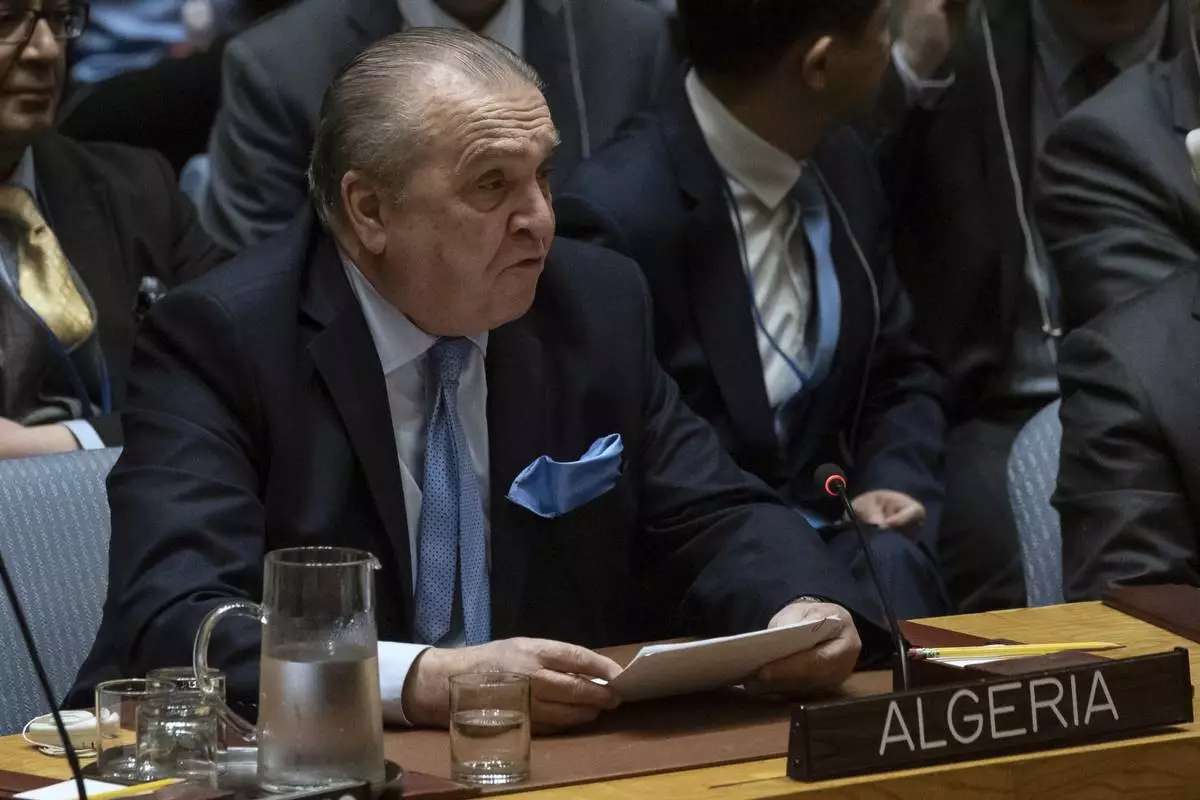
Algeria's Permanent Ambassador to the United Nations Amar Bendjama speaks during a Security Council meeting at United Nations headquarters, Thursday, April 18, 2024. (AP Photo/Yuki Iwamura)
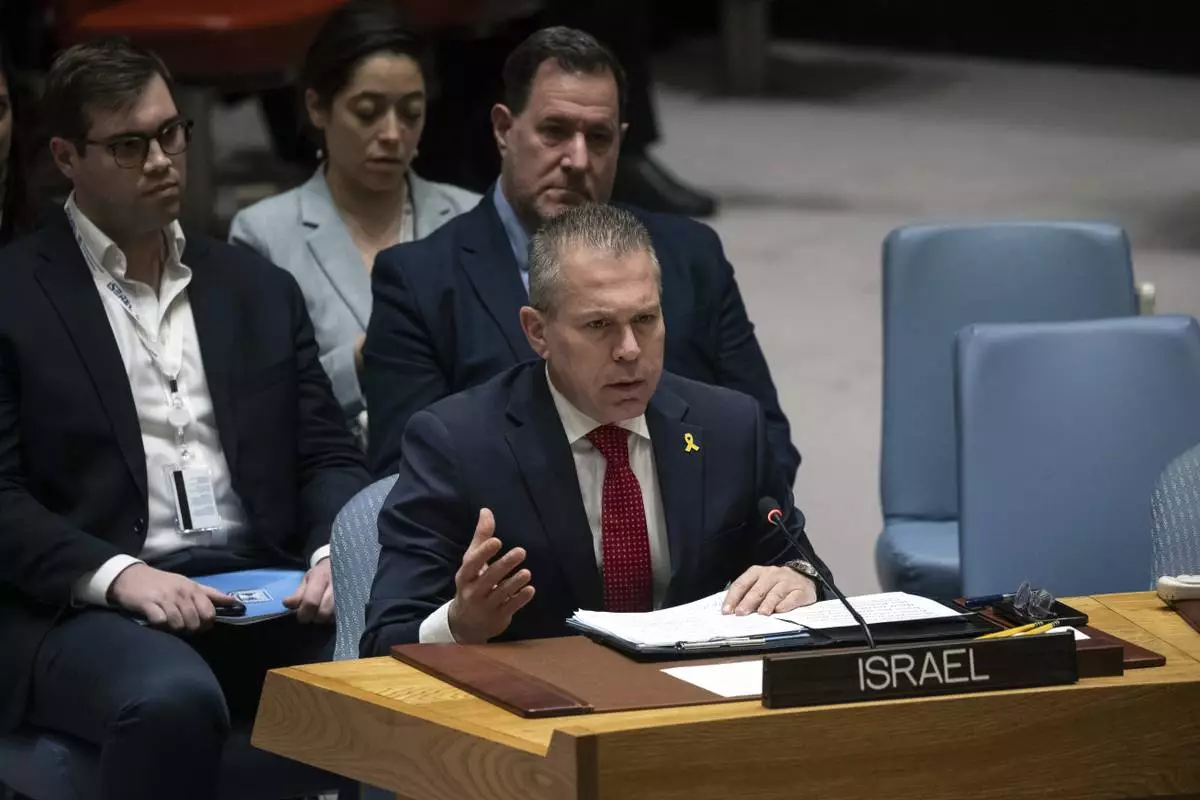
Israeli Ambassador to the United Nations Gilad Erdan speaks during a Security Council meeting at United Nations headquarters, Thursday, April 18, 2024. (AP Photo/Yuki Iwamura)
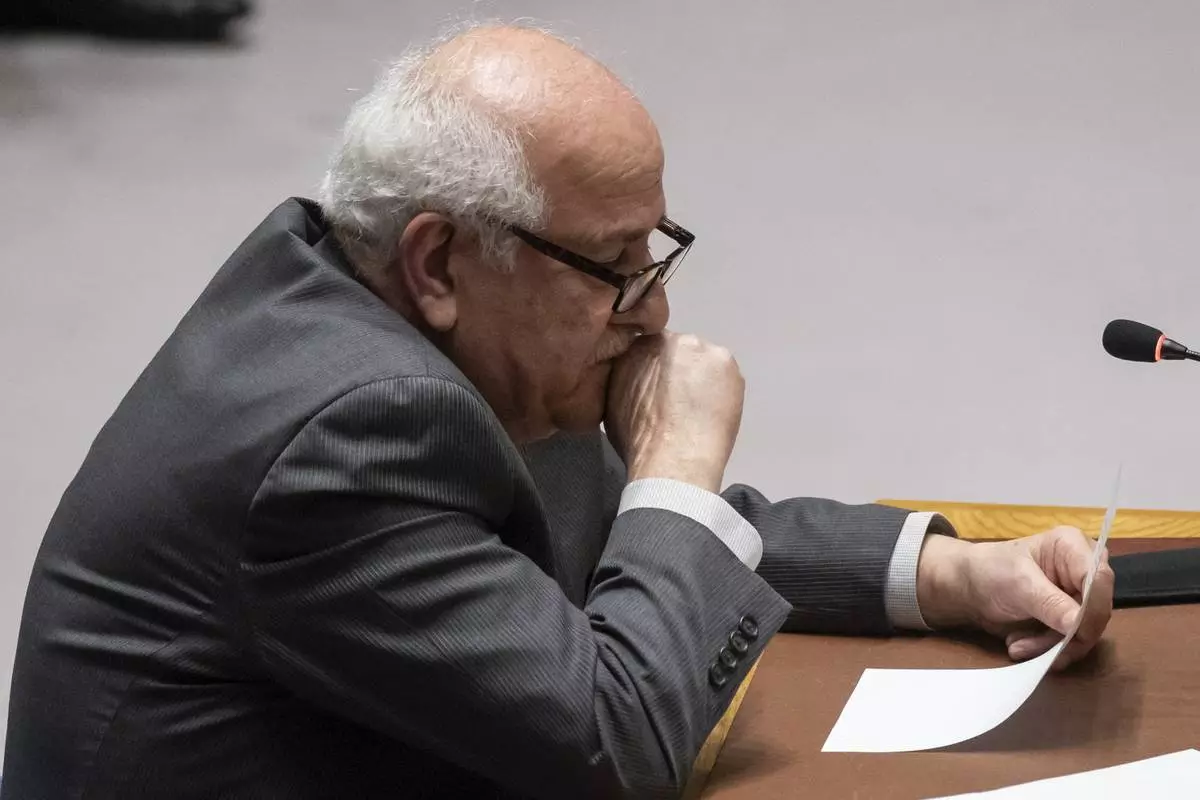
Palestinian Ambassador to the United Nations Riyad Mansour holds tears while speaking during a Security Council meeting at United Nations headquarters, Thursday, April 18, 2024. (AP Photo/Yuki Iwamura)
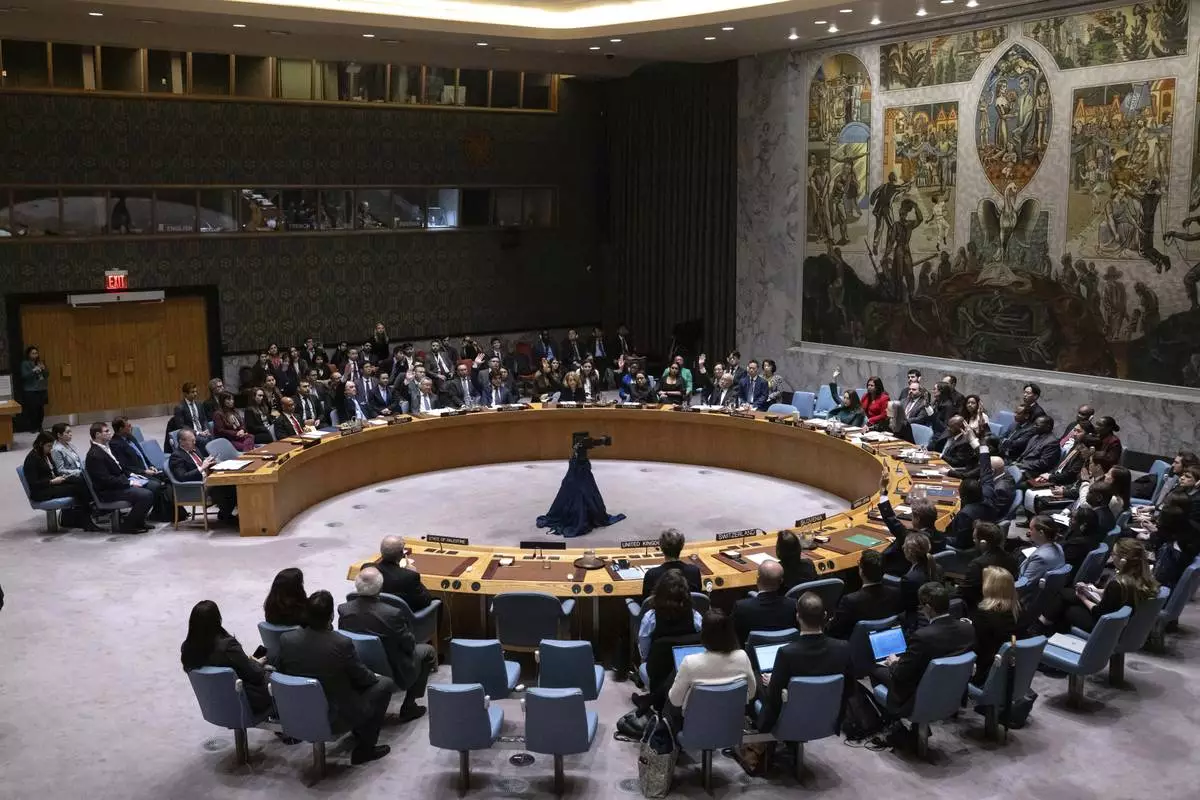
Representatives of member countries take votes during a Security Council meeting at United Nations headquarters, Thursday, April 18, 2024. (AP Photo/Yuki Iwamura)
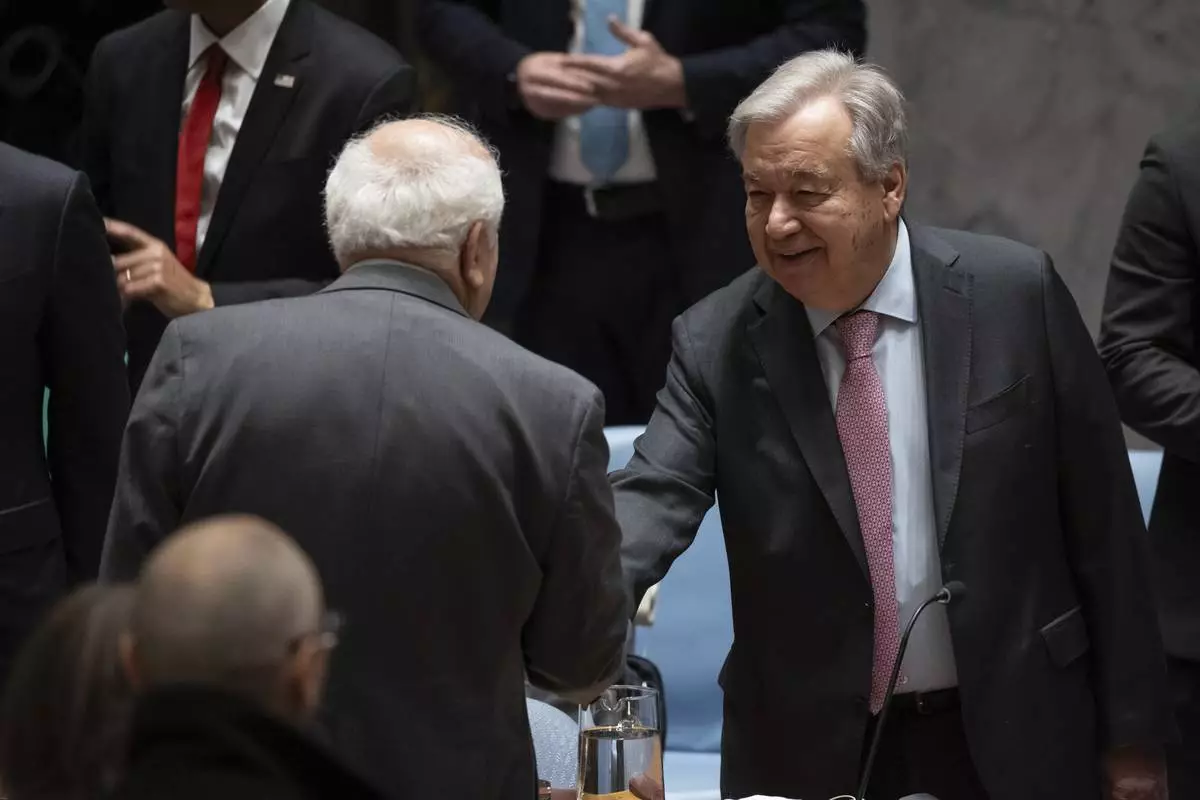
Palestinian Ambassador to the United Nations Riyad Mansour, left, and United Nations Secretary-General Antonio Guterres speak before a Security Council meeting at the United Nations headquarters, Thursday, April 18, 2024. (AP Photo/Yuki Iwamura)
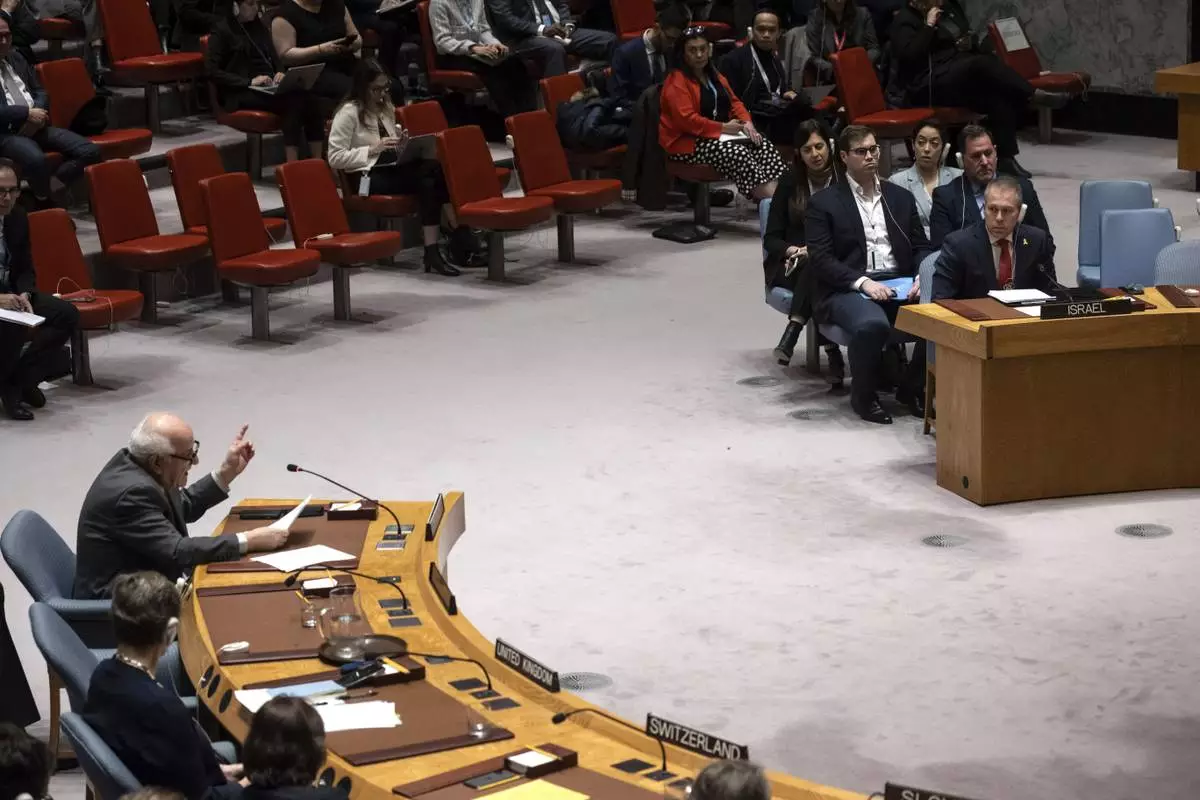
Palestinian Ambassador to the United Nations Riyad Mansour speaks during a Security Council meeting at United Nations headquarters, Thursday, April 18, 2024. (AP Photo/Yuki Iwamura)
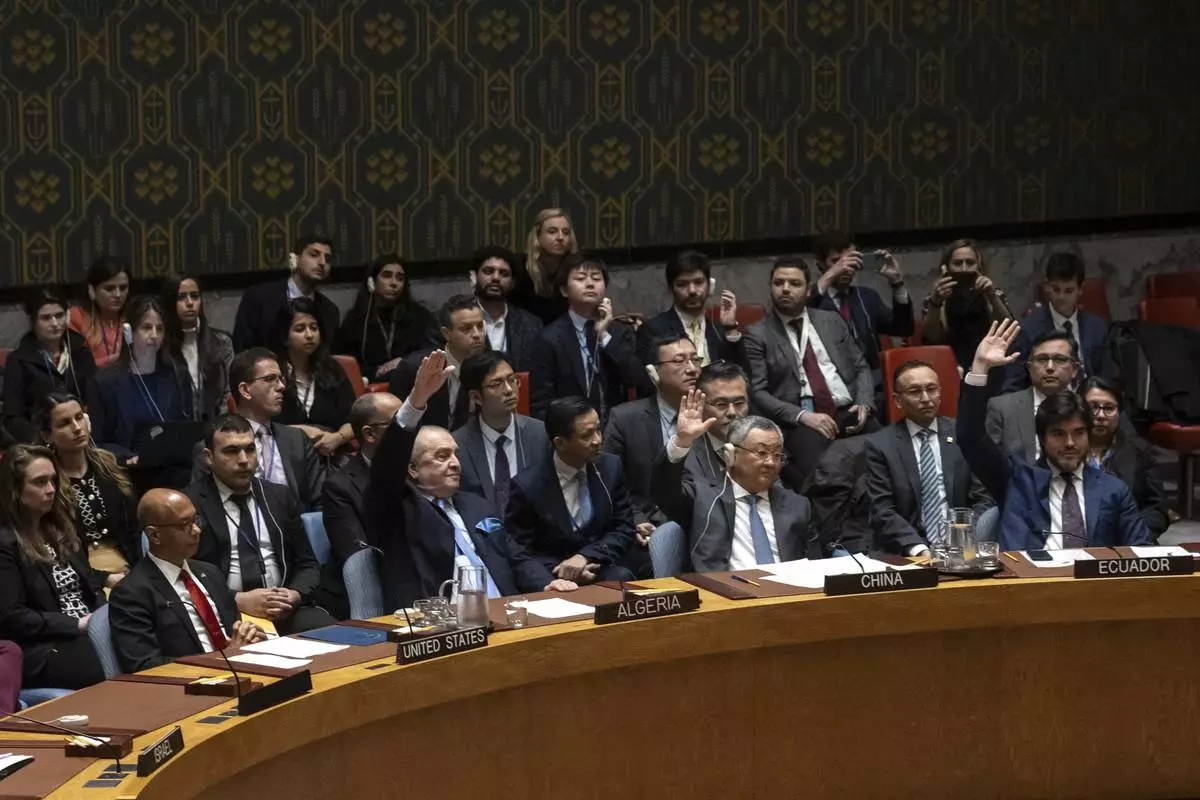
Representatives of member countries take votes during a Security Council meeting at United Nations headquarters, Thursday, April 18, 2024. (AP Photo/Yuki Iwamura)
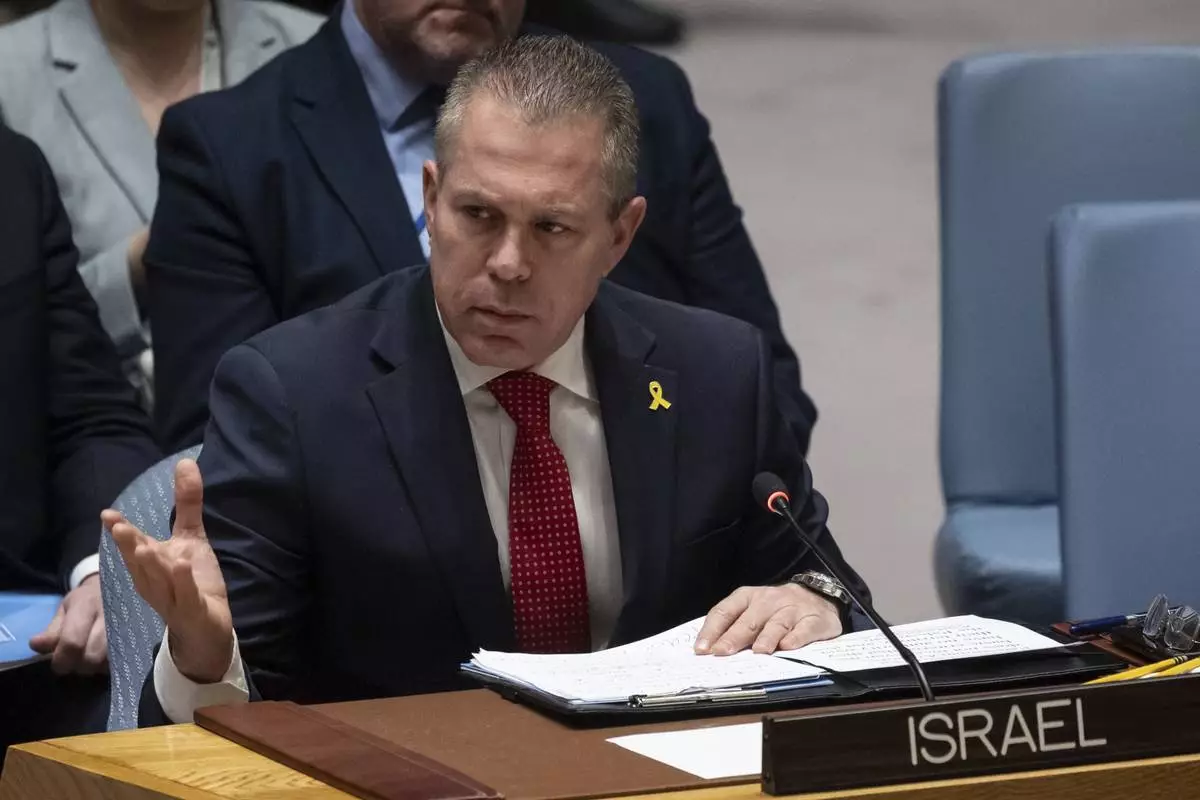
Israeli Ambassador to the United Nations Gilad Erdan speaks during a Security Council meeting at United Nations headquarters, Thursday, April 18, 2024. (AP Photo/Yuki Iwamura)
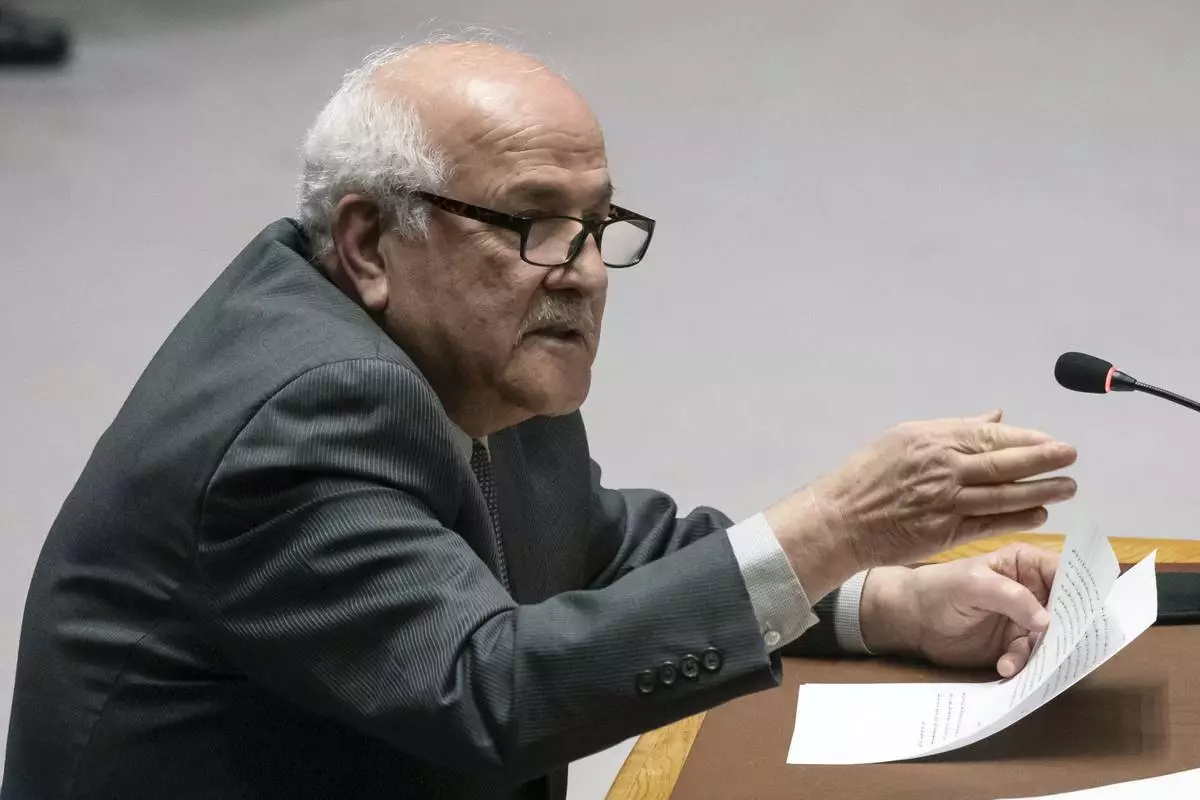
Palestinian Ambassador to the United Nations Riyad Mansour speaks during a Security Council meeting at United Nations headquarters, Thursday, April 18, 2024. (AP Photo/Yuki Iwamura)
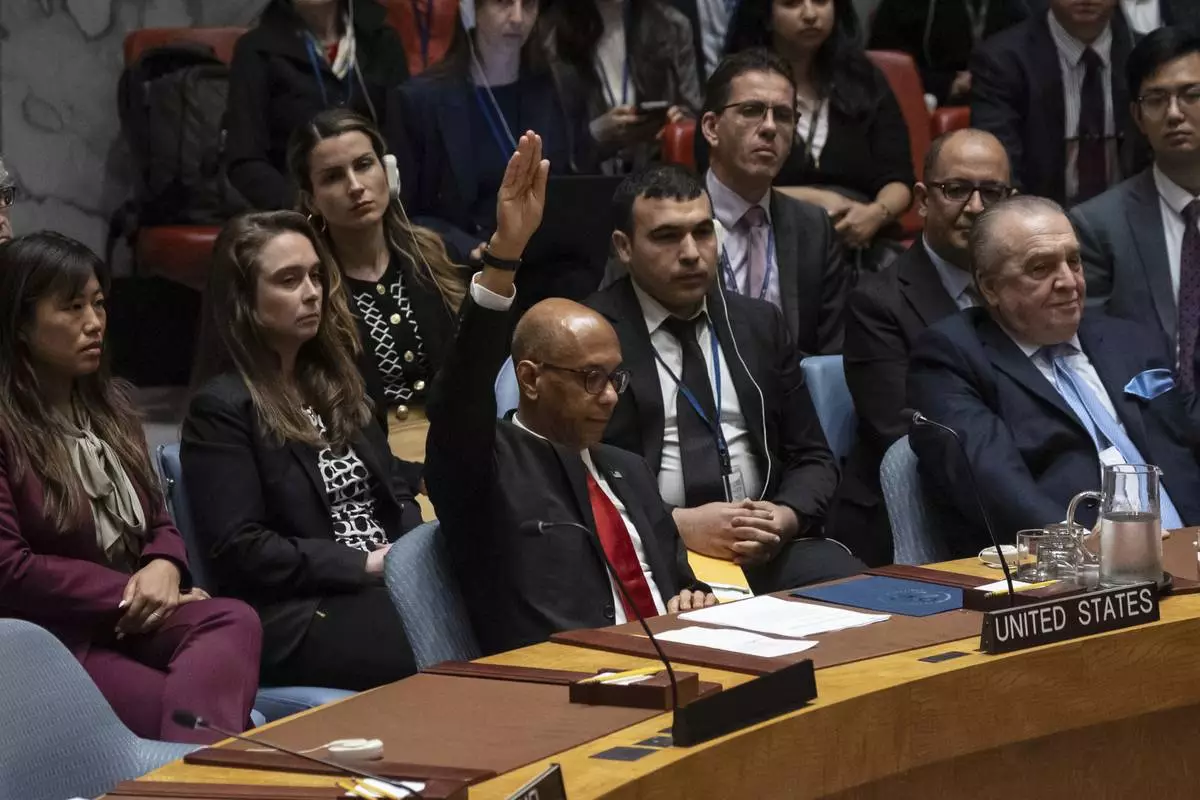
U.S. Deputy Ambassador Robert Wood votes against resolution during a Security Council meeting at United Nations headquarters, Thursday, April 18, 2024. (AP Photo/Yuki Iwamura)



















